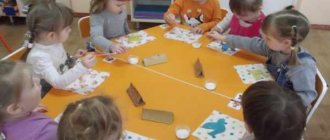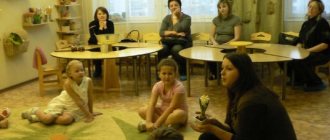Lesson summary for the senior group “It’s fashionable to be polite”
Summary of a lesson in kindergarten on the topic “Politeness” for children of senior preschool age
Author: Karabekova Ayikat Farkhadovna, teacher, MBDOU d/s “Beryozka” Goal: to form basic rules of politeness;
ideas about good and bad deeds; the ability to correctly evaluate oneself and others; show children the important role of polite words in people’s lives and encourage children to use polite words in their speech in various situations; develop communication skills in children. Progress of the lesson
Educator: Children stand in a circle.
Good morning to smiling faces!
Good morning to the sun and birds! Let everyone become kind and sympathetic. Let the good morning last until the evening! (Children sit down) Educator: In order to give joy to people, you need to be kind and polite. Children, tell me, who is a polite person? What does he look like? How does he speak? Maybe he speaks with magic words? Children's answers Educator: You are correct. A polite person does not forget to say greetings when meeting. He also always says goodbye when parting, apologizes if he caused someone inconvenience and thanks for their help. Always uses magic words in his speech. Educator: What magic words do you know? Children's answers Educator: Well done, I am so pleased that my children know so many magic words. Physical education lesson “Please don’t make a mistake” I will ask you to complete tasks, but you must complete them only when I say the magic word. Stand up please! Hands up! Please clap your hands! Stomp. Jump please! Please, hands forward. Please put your hands down. Please, tilt your head forward. Lean back please. Left. Right. Please, please take your seats. Now, let's play the game “Find a polite word” 1. The hedgehog sat on a stump under the tree - Hello, squirrel, Good afternoon, how are you, neighbor? Where were you today? 2. The eagle owl is waiting for a visit from a fox, a wolf, a woodpecker and a marten. The white tablecloth is covered. Everyone - Bon appetit! 3. The siskin began to say goodbye to his friend: “Goodbye, dear swift!” Tomorrow we will meet again to fly together 4. The cat was playing with a ball. Suddenly the ball hit the raccoon. The black cat meowed: “Excuse me, raccoon!” 5. The bear climbed into the bushes - the little bear was getting ready to sleep. The little bunny shouts to him: “Good night, bear!” What polite words did you hear? Now tell me how to greet correctly? Children's answers Educator: You need to look into the eyes, smile and say words of greeting. When you are addressed politely, how do you feel? Children's answers Educator: You are pleased, happy. If you were treated rudely, how do you feel? Children's answers Educator: You are offended, sad. And so as not to make you and I sad, we will now sing the song “From a Smile.” Educator: How warm and joyful my soul felt after such a good song. Let's play the game “Find the extra word” 1. Good afternoon, hello please; 2. I beg your pardon, goodbye, excuse me; 3. Thank you, thank you, bon appetit; 4. You're welcome, you're always welcome; 5. Thank you, see you soon, good night. Educator: Guys, I suggest you play. I will name actions, and you, in your places, will clap if the action is good and stamp your feet if the action is bad. 1. Offend little ones 2. Scream, talk loudly 3. Say hello when meeting 4. Sit down at the table dirty, unwashed 5. Always be neat 6. Give up your seat Well, our lesson has come to an end. And you and I continue to do good deeds every day and speak polite words to each other. If we are polite every day and hour, the world will become millions of times happier.
We recommend watching:
Leisure scenario in the senior preparatory group on the topic: Etiquette Notes on educational activities in the senior group “Journey to the Land of Polite Words” Fostering a culture of behavior in preschoolers Leisure notes in the senior group on the topic “Beauty Competition”
Similar articles:
Didactic manual on etiquette for children of senior preschool age
Summary of a lesson on cognitive development in the senior group. Ethical conversation
Scenario for an event in a preparatory group on the topic: “Birthdays only come once a year”
Summary of a lesson on cognitive development in the senior group. Table manners
Summary of a lesson on cognitive development in the senior group. Rules of life
General rules of child behavior
We invite you to consider presentations on the topic of children's behavior in various places in verse. You can show them to your child too.
On the street
At the table
On road
Away
Family behavior
From an early age, it is important to tell your son or daughter that it is worth behaving correctly not only in front of strangers, but also within the family circle. It is important to adhere to the following manners:
- Address older people politely and using “you”.
- You cannot speak rudely and impudently.
- It is not nice to yell at siblings or other family members.
- There is no need to sneak and deceive.
- If you need to enter the room of your parents, older brother or sister, you should definitely knock and ask permission to enter.
- It is necessary to treat family members with respect. If someone is resting, do not make noise.
- Do not interfere with parents' work or household chores.
- In the morning you need to wish good morning, and at night you need to wish good night.
A respectful attitude will prevent conflicts and form trusting relationships between family members.
If a quarrel occurs, it is important to try to make amends for the conflict and ask for forgiveness if it was your fault.
Street etiquette rules
It is important to teach your child to behave correctly not only at home, but also on the street. If a child does not know good manners, he will most likely receive condemnation from society. Let's consider the main principles of behavior:
- Garbage should only be thrown into a trash bin or trash can.
- You cannot pick flowers from flower beds, walk on lawns, climb into fountains or other places not intended for these purposes.
- It is not nice to point a finger at a person and talk about him out loud.
- The road should only be crossed at a pedestrian crossing.
- You must keep a line in the store.
- You should not pester strangers with questions or force your stories on them.
- It is forbidden to run far from your parents or hide during a walk.
- If you need to stop while walking along the sidewalk, for example to tie your shoelaces, you should step aside.
In addition, it is important to teach your child not to offend other boys and girls on playgrounds and in the park.
You cannot take away toys, say hurtful words, push on slides and fight.
Basic standards of safe behavior in the summer on water and in nature
When relaxing at sea or in the forest, there are separate etiquette standards for children and older children. Let's look at them in more detail:
- It is forbidden to go far from the resting place.
- It is forbidden to climb into a fire if an adult has lit a fire.
- When eating, it is important to follow the same rules that are used at the table.
- You cannot throw garbage or break tree branches.
- It is forbidden to enter the water without parents and to swim far from the shore.
- It is important to maintain good hygiene and not put your hands in your mouth.
In the pictures below you can see illustrated rules of behavior on the water.
In the following illustration you can familiarize yourself with the basic rules of behavior in the forest. They apply to children and adults.
How to behave if your child is alone at home
Situations often arise that parents are forced to leave their son or daughter at home for a while. At the same time, it is extremely important to explain to the child how to behave in this case. The main rules include:
- You cannot open windows or a balcony if it is a multi-story building.
- It is prohibited to open the gas or use matches or lighters.
- Do not open the water and play with it.
- It is better to spend time quietly, reading books or watching cartoons.
- It is forbidden to invite guests without permission.
- In any emergency, you should call your parents.
- It is forbidden to go outside without leaving the apartment.
- If there is a fire, you need to call “01”, if strangers are breaking into the apartment, you need to call “02”.
Under no circumstances should you open doors to strangers. If a stranger asks if you are alone at home, say: “Dad is sleeping, you can come later.”
Rules of etiquette at cultural events
Children 6-7 years old often go with their parents to cinemas, the circus, various concerts or exhibitions. It is important to know how to behave in such a situation.
Let's name the main rules:
- You must not be late for the start of the show.
- Before entering the hall, you need to take off your outerwear if it is a cold season.
- You must enter the hall before the start of the event so that after it starts you do not disturb other people by taking your place.
- If for some reason you were delayed or went to the restroom, you need to return to your seat facing the people sitting.
- Avoid talking during the session or eating popcorn or other food too loudly.
After finishing the program, you should not run to the exit, pushing other people. You should calmly go out with other visitors.
Rules of behavior during a school lesson
Children of early school age, as well as children 10-12 years old and older, should know the norms of behavior in a school lesson.
Let's call them:
- You need to sit quietly.
- It is important to listen carefully to the teacher.
- When the teacher enters the classroom, the children stand up.
- If you need to go to the toilet, you need to raise your hand and ask permission.
- You can't talk to classmates.
- If you are asked, it is important to stand up and go to the board.
Each class's rules of conduct may be slightly different. The teacher tells the children about the norms of behavior and monitors their implementation.
Principles of behavior in public transport
There are also certain standards of behavior in public transport. All children and parents have to travel on a tram or bus at some point. What you need to know:
- It is necessary to give way to an elderly person or people with disabilities.
- Pregnant women should also give up their seat.
- You should not have a telephone conversation that is too loud. If you need to talk on the phone, this should be done in halftone.
- As for communicating with each other, the conversation should be conducted quietly, without shouting.
- When traveling by train, there is no need to run around the carriage, talk loudly and pester passengers with questions.
- You are not allowed to leave your seat on the plane. If you need to go to the toilet, this should only be done accompanied by your parents.
- Under no circumstances should you dirty other passengers if your shoes are dirty.
- Laughing loudly and singing songs is prohibited.
No matter what kind of transport the child is in, it is forbidden to move far from the parents.
At what age should children be taught etiquette?
By telling the child about the rules of etiquette, we teach him good manners. It is necessary to explain to a child how to behave and how not to behave from the time he begins to walk independently, eat at a common table, talk, and actively communicate with people and peers. From about 1.5 years of age, the child needs to be explained and shown how to behave at the table. If before this time, he was forgiven for having a table, face, hands covered in porridge, forgiven for the fact that he could take food from someone else’s plate, etc., now he should take this more seriously. The child has already developed a fairly well-developed awareness of what is happening, what is being told to him, what is being demanded of him. When he starts talking, you need to explain how to behave with people. For example, when meeting someone you know, ask your child to say hello, and when parting, ask him to say “goodbye.” For ease of communication, usually very young children are first taught to say the words “hello”, “bye”, “you”. This is also education, at the most basic level. At the age of 2-3 years, it is necessary to explain that such treatment is appropriate with peers, but with adults it is necessary to communicate differently, with more restraint.




